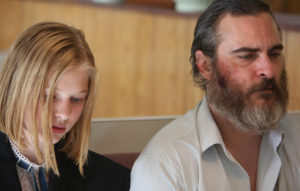 Movie Journal: Wisconsin Film Festival Programming, Part One of Three
Movie Journal: Wisconsin Film Festival Programming, Part One of Three
2018 Wisconsin Film Festival, April 5 through April 12
Film Guide available at 2018.wifilmfest.org»
Today: The Big Auteurs—International Narrative Features
Next: The Big Indies—American Narrative Features
And: The Big Docs—Non-Fiction Features
For other entries in our 2018 Wisconsin Film Festival coverage, click on #wifilmfest in the navigation menu.
Jason Fuhrman kicks off the Madison Film Forum tradition of breaking down the “Big Three” categories at the 2018 Wisconsin Film Festival. This year, Jason focuses on the particularly strong contingent of international films made by female directors.
As women behind the camera continue to reshape the male-dominated cinematic landscape in America and abroad, I am particularly excited about the variety of works by female filmmakers in this year’s festival lineup.
The following selection highlights new titles by international directors with strong and wildly divergent artistic visions, including the impressive debut of an up-and-coming Zambian-Welsh filmmaker; a dark romantic comedy from the great Claire Denis; a spectacular mash-up of high art and vintage exploitation cinema; an exquisite period piece by Austrian auteur Barbara Alberts; a bloody, stylish rape-revenge fantasy in line with the French New Extremity movement; a Norwegian-Pakistani coming-of-age social horror drama; and the latest film by Scottish art-house favorite Lynne Ramsay, a stark, powerful sex-trafficking thriller.
Taken together, these works present a fascinating cross-section of contemporary female perspectives in world cinema, while offering audiences a cogent glimpse into the future of film.
 I Am Not a Witch | Rungano Nyoni | UK, France, Germany | 2017 | 93 minutes
I Am Not a Witch | Rungano Nyoni | UK, France, Germany | 2017 | 93 minutes
I Am Not a Witch has garnered praise for its striking imagery, bold sense of humor, and multilayered approach to narrative. This internationally acclaimed drama exhibits the talents of a promising young director to a wide audience, while bringing her relatively unknown homeland to cinematic life. Born in Zambia and raised in Wales, Rungano Nyoni studied drama at the London University of Arts before turning to filmmaking in 2009.
Her first feature film tells the story of an eight-year-old Zambian girl accused of being a witch. I Am Not a Witch was screened in the Directors’ Fortnight section at the 2017 Cannes Film Festival and won the BAFTA Award for Outstanding Debut by a British Writer, Director, or Producer. Nyoni told BBC Wales arts and media correspondent Huw Thomas that she feels both Zambia and Wales are inadequately represented in cinema. She intends to continue making films in both her native and adopted country.
In an illuminating interview with Beth Webb, Nyoni discusses, among other topics, the intersection of witchcraft and gender politics in African society, how seeing Michael Haneke’s The Piano Teacher (2001) in her late teens inspired her to become a filmmaker, and how she used Stanley Kubrick’s Cold War satire Dr. Strangelove, or: How I Learned to Stop Worrying and Love the Bomb (1964) as a point of reference in dealing with tragic events on film.
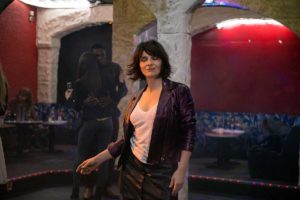 Let the Sunshine In | Claire Denis | France, Belgium | 2017 | 94 minutes
Let the Sunshine In | Claire Denis | France, Belgium | 2017 | 94 minutes
Denis’ latest film appears to consist of lighter material than her previous work and it represents a radical departure. An adaptation of Roland Barthes’s 1977 text A Lover’s Discourse: Fragments, Let the Sunshine In stars the always luminous Juliette Binoche as a perpetually dissatisfied artist looking for true love. While this marks the first time Denis has made a romantic comedy, her approach to the genre promises to be anything but ordinary, given the filmmaker’s history.
As the film industry finally seems more willing to accommodate female perspectives in cinema, every devoted moviegoer should know about Claire Denis. The acclaimed French director and writer has been actively making films since the late 1980s, while establishing her reputation as one of the most original and provocative voices in contemporary international cinema. According to columnist Charles Taylor, “Claire Denis has been able to reconcile the lyricism of French cinema with the impulse to capture the often harsh face of contemporary France.” Her consistently stunning output includes the remarkable debut Chocolat (1988), a semi-autobiographical meditation on colonialism in Africa, Trouble Every Day (2001), a transgressive erotic horror masterpiece, and White Material (2009), an intense character study of an entitled white woman living in an unidentified post-colonial African country amid a civil war.
Let the Sunshine In opened the Directors’ Fortnight section at the 2017 Cannes Film Festival and won the SACD Award presented by France’s Society of Dramatic Authors and Composers.
Considering the fact that Denis’ most recent film, Bastards (2013), received only one theatrical screening in town (as part of the Madison Museum of Contemporary Art’s Spotlight Cinema series) and White Material played for just a limited time at the theater formerly known as Sundance Cinemas, this might be your only chance to see her latest work on a big screen here.
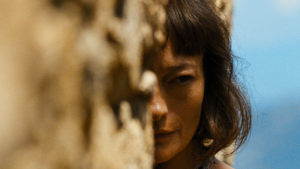 Let the Corpses Tan | Hélène Cattet, Bruno Forzani | France, Belgium | 2017 | 90 minutes
Let the Corpses Tan | Hélène Cattet, Bruno Forzani | France, Belgium | 2017 | 90 minutes
Let the Corpses Tan will almost certainly appeal to anyone who enjoyed The Strange Color of Your Body’s Tears (2013) at the UW Cinematheque in the fall of 2014. Following their visually exquisite, labyrinthine and deliriously nightmarish variation on the giallo genre, Belgian filmmakers Hélène Cattet and Bruno Forzani have returned with another meticulously crafted, lurid homage to vintage exploitation films, this time violent Italian crime thrillers of the 1970s. Based on an influential 1971 pulp novel by Jean-Pierre Bastid, Let the Corpses Tan apparently continues Cattet and Forzani’s method of turning the most stylized aspects of outdated movie genres into the emphasis of the film.
Photographed on grainy Super 16mm film with a nostalgic soundscape consisting mostly of lush musical pieces by legendary composer Ennio Morricone, Cattet and Forzani’s third feature delivers a spectacularly fractured, frenetic succession of images and sounds “like a celluloid shotgun blast to the synapses,” as Peter Kuplowsky puts it.
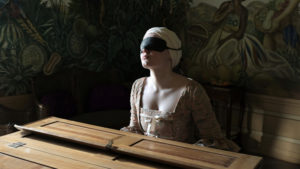 Mademoiselle Paradis | Barbara Albert | Austria, Germany | 2017 | 97 minutes
Mademoiselle Paradis | Barbara Albert | Austria, Germany | 2017 | 97 minutes
This film immediately invites comparisons to A Dangerous Method (2011) by David Cronenberg. A sumptuous, multilayered and illuminating historical drama set in 18th century Vienna, Mademoiselle Paradis tells the true story of the complex relationship between a blind virtuoso pianist and the controversial physician who worked to restore her sight: Dr. Franz Mesmer.
Director Barbara Albert and screenwriter Kathrin Resetarits (herself an avant-garde filmmaker) address the sociohistorical limitations confronted by women. Adapted from the novel Mesmerized by Alissa Walser, Albert’s film critically examines science, art, perception, and gender dynamics in Mozart-era Austrian high society.
Many reviews of Mademoiselle Paradis highlight the superb performance of Romanian leading lady Maria-Victoria Dragus as the titular heroine. “Even in more peaceful moments,” film critic Guy Lodge observes, “Dragus conveys the sense of a woman genuinely overwhelmed by her own senses. That awareness is elegantly carried over into Albert’s filmmaking: in the subtle distortions of the sound design, or the fine intrusions of sunlight and shadow on Christine A. Meier’s rigorously composed widescreen lensing.”
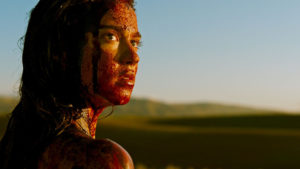 Revenge | Coraline Fargeat | France | 2017 | 108 minutes
Revenge | Coraline Fargeat | France | 2017 | 108 minutes
With her vigorously stylized, gritty and ultraviolent rape-revenge thriller, French newcomer Coralie Fargeat turns a typically base, clichéd and problematic subgenre of horror inside out. The simple plot concerns a traumatic, graphically staged sexual assault which nearly kills the Lolita-like heroine, followed by an incredible return and brutal retaliation that echoes Alejandro G. Iñárritu’s The Revenant (2015).
According to Fargeat, the film features so much blood that the prop team would often run out of fake blood. For an idea of the film’s visceral intensity, Katie Rife offers a hint: “Think taking peyote as an anesthetic before performing self-surgery with a beer can and a rusty knife.” One audience member at the film’s midnight premiere at the Toronto International Film Festival was attended to by paramedics and promptly removed from the screening when he reportedly suffered a seizure after a particularly disturbing scene. Squeamish viewers should probably avoid Revenge, but such an extreme reaction testifies to the exceptional potency of Fargeat’s debut feature.
 What Will People Say | Iram Haq | Norway, Germany, Sweden | 2017 | 106 minutes
What Will People Say | Iram Haq | Norway, Germany, Sweden | 2017 | 106 minutes
Based on the harrowing real-life experience of writer-director Iram Haq, who was once kidnapped in Pakistan, What Will People Say puts a provocative new cultural twist on the well-worn sexual coming-of-age story.
Her sophomore work reveals the double life of a 16-year-old girl raised in Oslo who violently clashes with the traditional values and stern expectations of her Pakistani émigré parents. After supposedly destroying their honor, she finds herself exiled to Pakistan, where she essentially becomes a prisoner in a country that remains totally foreign to her. Maria Mozhdah, who was born in Pakistan but grew up in Norway, brings an additional layer of authenticity to the film.
The Toronto International Film Festival synopsis describes What Will People Say as an “empathetic story of family, community, and culture.” but Jared Mobarak calls it a “social horror” film. Haq’s first feature, I Am Yours, another film about a young woman struggling to balance two cultures, was Norway’s submission for Best Foreign Film in the 2013 Academy Awards.
 You Were Never Really Here | Lynne Ramsay | USA | 2017 | 89 minutes
You Were Never Really Here | Lynne Ramsay | USA | 2017 | 89 minutes
Although You Were Never Really Here was made in the United States and the 2018 festival guide lists the film in its “American Visions” section, director Lynne Ramsay originates from Scotland. Therefore I have included it among my previews of international narrative features.
Ramsay’s dazzling, kaleidoscopic character study of a young woman on a journey of self-discovery, Morvern Callar (2002), was a 2003 Wisconsin Film Festival selection and remains one of my all-time personal favorite films. As a result of the Tuesday Night Movie Club series at the Marquee theater in Union South, I recently had the opportunity to see a rare 35mm print of Ramsay’s cinematic gem, which was glorious. At the screening, senior programmer Mike King announced that the Scottish auteur’s latest film would be presented at the 20th Annual Wisconsin Film Festival.
Ramsay has not made a feature since her elliptical, challenging We Need to Talk About Kevin (2011). Needless to say, I am over the moon about this selection.
Based on Jonathan Ames’ hard-boiled 2013 novella of the same title, You Were Never Really Here follows Joe (Phoenix), a traumatized, suicidal war veteran and ex-FBI agent who now makes a grim living as a contract killer specializing in the sex-slavery trade. A prominent New York senator hires Joe to rescue his 14-year-old daughter, who has been abducted and forced to work as a child prostitute. The assignment seems straightforward until things go awry and Joe inevitably becomes entangled in a complex network of individual and institutional corruption.
Ramsay banged out the script after abruptly withdrawing from another movie (the female-led western Jane Got a Gun) on the first day of production. She told Xan Brooks that she wrote the lead role specifically with Phoenix in mind: “Stuck his picture above the computer, as though I could telepathically put him in my film.” Lo and behold, the actor materialized on the set, without ever having met Ramsay before.
Although an incomplete version of You Were Never Really Here premiered at the 70th Annual Cannes Film Festival as a “work in progress,” Phoenix won a Best Actor award and Ramsay took home the trophy for Best Screenplay, which seems particularly impressive, given how sparse the dialogue remains throughout her movie.
Ramsay’s previous films exhibit her oblique, highly idiosyncratic approach to literary adaptation, in which the source material merely serves as a springboard for a stark, evocative portrait of an interior landscape. She has always clearly been more interested in probing the deepest recesses of her characters’ fractured psyches than in conventional linear storytelling. With an eye for rigorous, visually striking compositions that come close to abstraction, Ramsay (who was originally a still photographer) tends to convey subjective experiences by capturing fleeting impressions of reality and mood. Her singular films are elusively poetic, brutally honest and often unexpectedly humorous.
Since her astonishing debut, Ratcatcher (1999), Ramsay has fearlessly plunged into increasingly dark corridors of the human condition, while pushing her exacting stylistic formalism further than many directors would ever dare.